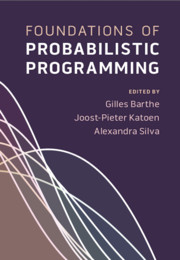Book contents
- Frontmatter
- Contents
- List of Contributors
- Preface
- 1 Semantics of Probabilistic Programming: A Gentle Introduction
- 2 Probabilistic Programs as Measures
- 3 Application ofComputable Distributions to the Semantics of Probabilistic Programs
- 4 On Probabilistic λ-Calculi
- 5 Probabilistic Couplings from Program Logics
- 6 Expected Runtime Analyis by Program Verification
- 7 Termination Analysis of Probabilistic Programs with Martingales
- 8 Quantitative Analysis of Programs with Probabilities and Concentration of Measure Inequalities
- 9 The Logical Essentials of Bayesian Reasoning
- 10 Quantitative Equational Reasoning
- 11 Probabilistic Abstract Interpretation: Sound Inference and Application to Privacy
- 12 Quantitative Information Flow with Monads in Haskell
- 13 Luck: A Probabilistic Language for Testing
- 14 Tabular: Probabilistic Inference from the Spreadsheet
- 15 Programming Unreliable Hardware
6 - Expected Runtime Analyis by Program Verification
Published online by Cambridge University Press: 18 November 2020
- Frontmatter
- Contents
- List of Contributors
- Preface
- 1 Semantics of Probabilistic Programming: A Gentle Introduction
- 2 Probabilistic Programs as Measures
- 3 Application ofComputable Distributions to the Semantics of Probabilistic Programs
- 4 On Probabilistic λ-Calculi
- 5 Probabilistic Couplings from Program Logics
- 6 Expected Runtime Analyis by Program Verification
- 7 Termination Analysis of Probabilistic Programs with Martingales
- 8 Quantitative Analysis of Programs with Probabilities and Concentration of Measure Inequalities
- 9 The Logical Essentials of Bayesian Reasoning
- 10 Quantitative Equational Reasoning
- 11 Probabilistic Abstract Interpretation: Sound Inference and Application to Privacy
- 12 Quantitative Information Flow with Monads in Haskell
- 13 Luck: A Probabilistic Language for Testing
- 14 Tabular: Probabilistic Inference from the Spreadsheet
- 15 Programming Unreliable Hardware
Summary
This chapter is concerned with analysing the expected runtime of probabilistic programs by exploiting program verification techniques. We introduce a weakest pre-conditioning framework á la Dijkstra that enables to determine the expected runtime in a compositional manner. Like weakest pre-conditions, it is a reasoning framework at the syntax level of programs. Applications of the weakest pre-conditioning framework include determining the expected runtime of randomised algorithms, as well as determining whether a program is positive almost-surely terminating, i.e., whether the expected number of computation steps until termination is finite for every possible input. For Bayesian networks, a restricted class of probabilistic programs, we show that the expected runtime analysis can be fully automated. In this way, the simulation time under rejection sampling can be determined. This is particularly useful for ill-conditioned inference queries.
Keywords
- Type
- Chapter
- Information
- Foundations of Probabilistic Programming , pp. 185 - 220Publisher: Cambridge University PressPrint publication year: 2020
- Creative Commons
- This content is Open Access and distributed under the terms of the Creative Commons Attribution licence CC-BY 4.0 https://creativecommons.org/cclicenses/
- 7
- Cited by

